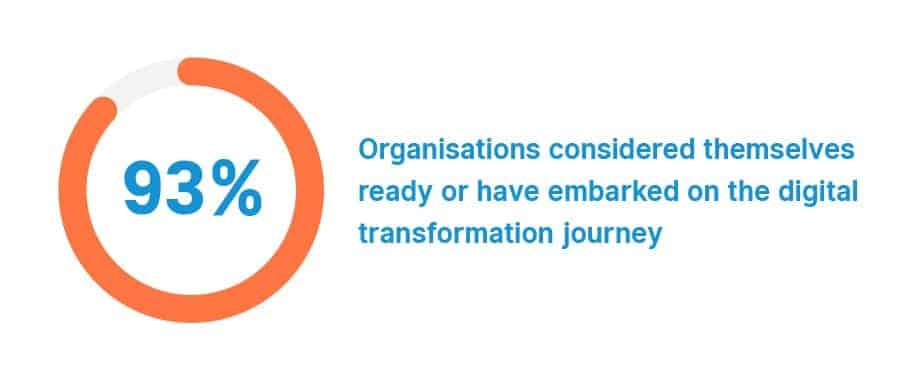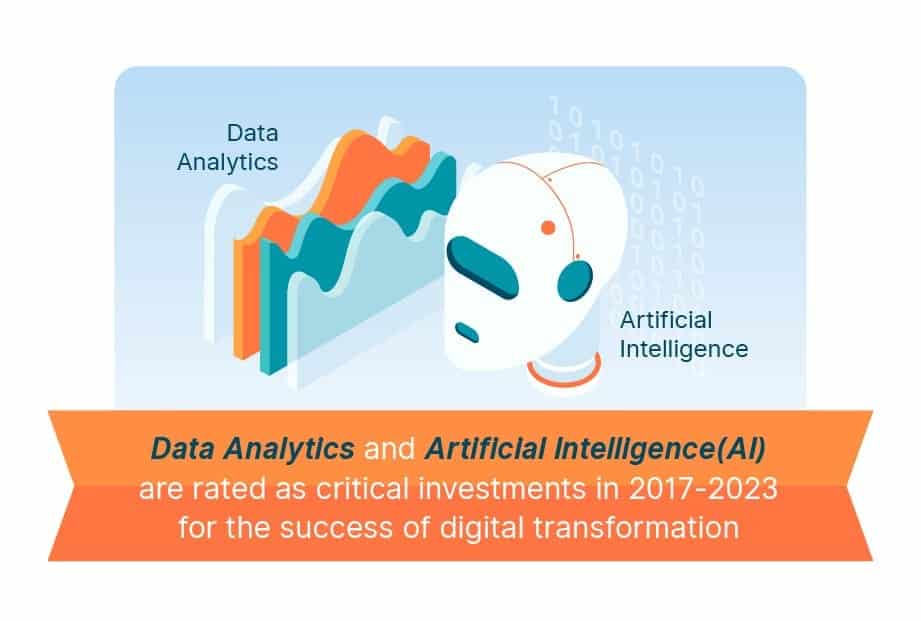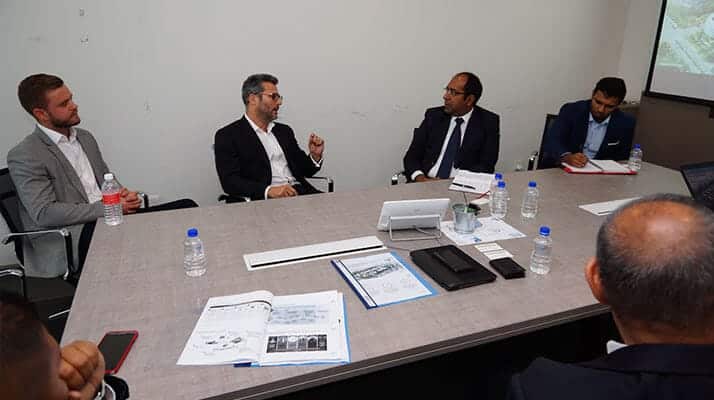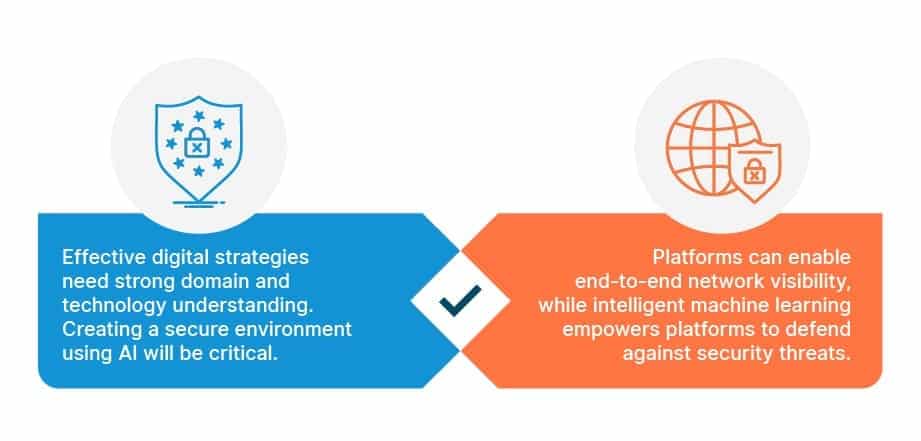


Digital transformation is one of the key strategic goals for enterprises and the public sector across the region. An Asia Pacific end-user survey by Frost & Sullivan highlighted that 93% of the organisations surveyed considered themselves ready or have embarked on the digital transformation journey. Further result from the survey shows data analytics and Artificial Intelligence (AI) were rated as critical investments over 2017 – 2023 to the success of their digital transformation.

The drivers for these investments however vary significantly depending on the size and digital maturity of these organisations. To ensure desired business outcomes, enterprises are continuously exploring new technologies and investing in critical enablers such as Data Analytics and AI - as analytics itself has undergone a paradigm shift over the recent years - from data warehousing and mining to providing predictive business intelligence.
As organisations adjust to the rapidly changing digital lifestyle of consumers worldwide, they are discovering the importance of understanding and envisaging the impact of information generated from digital sources. Sophisticated analytic capabilities and intuitive visualisations are driving a profound change in how marketing, advertising, communications, supply chains, value chains, processes, transactions and deals are going to be accomplished.
Amongst other verticals, leading BFSI and Energy companies are building their digital transformation strategies as the foundation for sustained growth. While, the BFSI sector has leveraged digital extensively over the years, there is continued focus on adopting technologies that can enable improved cost of operations, streamline processes and create better customer experience. Big Data and AI tools are being deployed extensively by banks in the region to ensure greater compliance as well as gain deeper customer insights to identify cross-sell opportunities. Besides, emerging technologies like blockchain, continue to transform the industry, in a way that may completely disrupt traditional banking in years to come.
Digital has also emerged as the key enabler in Energy sector, driven by the need to reduce costs, make faster and better decisions, and to increase operational productivity. Besides operational applications and digital asset management, Internet of Things (IoT) driven applications are creating a data-first approach to managing existing assets, supply chains, or customer relationships. Integrated deployment strategy with analytics is becoming the key for Energy companies to unlock value and potential.
The constant advancement of hardware and breakthrough Machine Learning (ML) algorithms has also unleashed a new wave of exponential progress that is set to affect every industry. True success in AI depends on access and timeliness of data, drawing insights and utility from the Internet of Things and Big Data paradigms. While all industries stand to benefit from this, the adoption is at different levels.
Telekom Malaysia’s (TM) end-to-end solutions and services capabilities create a compelling value proposition for enterprises and is also demonstrating a continued focus towards creating value for supporting enterprises in their transformation journey. TM’s offerings across software applications, network services, Tier-III Data Centre, Cloud services, high-performance computing infrastructure and managed services position it well to partner with enterprises in their digital journey.
Given TM’s strong focus towards offering digital solutions for both BFSI and Energy Industries, TM led a strategic initiative of inviting UK based AI companies (in partnership with British High Commission) in October 2018. Close and intensive engagements with these AI companies helped explore opportunities for collaboration and identify means to create greater value for BFSI and Energy organisations in the region.

The initial discussion started with an introduction on TM solutions and capabilities, as well as TM’s strong understanding of the Malaysian Market. Led by Wan Ahmad Kamal, Executive Vice President, Enterprise Business, TM One, the conversation deep-dived into how the nation’s Convergence Champion and No. 1 Converged Communications Services Provider, has transformed itself to fully support both BFSI and Energy industry’s transformation journey and continuously be relevant in the digital market.
He added that by having a deeper understanding of verticals, TM is better equipped at delivering solutions and services packed with high security standards catered to the need of the BFSI and Energy industries. TM, through its business solutions arm, TM One, assures securities aspects of both industries via its Twin Core Data Centre’s world class security capabilities.
TM One's Twin Core Data centre, comprises two-state-of-the-art Data Centres, named as Iskandar Puteri Data Centre (IPDC) that is located at Iskandar Puteri in Johor and Klang Valley Data Centre in Cyberjaya, Klang Valley. IPDC is in compliance with various industry and security certification standards, including undergoing threat, vulnerability and risk assessment (TVRA), ISO27001, as well as PCI DSS1. While KVDC, will be undergoing a few rounds of certification processes to complement its sister twin, after 3 months of operation once construction completes in early 2019.
Wan Ahmad Kamal added that with the Twin Core infrastructure in place, scalability, flexibility and agility will no longer be an issue. As speed to market becomes critical for both of these industries, the need to scale with technology that is constantly agile, capabilities and competencies that are always available and on top of an infrastructure that is robust through changing times, is crucial to maintain a business’ relevancy and competitiveness in the market.
He also commented that TM One has been involved in various infrastructure investments in order to support both of these industries. Among the solutions provided are TM One’s Multi-Cloud Services, Twin Core DC Disaster Recovery (DR) services and TM’s very own TM One ID Hub, or widely known as eKnowYourCustomer (eKYC) and Managed Security.
Digital transformation entails the integration of digital technology into all areas of business, and these integrations would then drive the fundamental changes of how a business operates and deliver value to its customers.
Driving the discussion further, the AI vendors explained how their technology capabilities enable businesses to enhance their customer experience, optimise processes and operations as well as improve security in a highly data intensive environment. The discussion focused on how businesses are taking precautionary measures in their own digital transformation journey.
Everyone generally agreed that by going digital, the banking and insurance companies would require clear articulated strategy, funding, talent, agile ways of working and an internal culture that is willing to take risks in order to transform their businesses. As for the Energy industry, there is a need to optimise operational performance that would significantly reduce costs and minimise risks throughout the transformation process.
It is clear that to drive transformation; an organisation would require a thorough enhancement to the business’ organisational efficiency and increase the speed of delivery to its customers. Opinsta, one of the UK companies, showcased their capabilities in countering operational challenges. The company specialises in amplifying an organisation’s operational potential, in essence, by putting routine business processes into an automated and digitised mode.
Their capabilities include digitising and innovating customer-related business operations, with a multifunctional app that acts as a bridge to employees of all levels. It serves as a tool for efficient maintenance reporting and to minimise manual processes altogether.
As experts in rapid build, development and support in amplifying operational performance, they have to-date built nine (9) separate solutions that caters to specific business requirements.
It was clear that digital has changed the way businesses operate over the years. Given its impact it has on businesses, the risk of human error would bound to happen along the way. Jazz Networks, another UK company involved in the discussion, explained that businesses need to mitigate human error from the source.
They continued to explain that their technology was created to address complexities of human behaviour and the countless times humans have indirectly bypassed security built to protect them. Their platform is equipped with an advanced learning systems that collects and analyses human behavioural data of users on the network, and detect flagged activities that is considered suspicious.
This platform gives the administrator a complete transparent view of the network – with a user interface that analyses the collected data to ensure end-to-end visibility for each activity happening on the network.
Jazz Networks takes accuracy and transparency seriously. Their platform enables users to view real-time data that will help them make benefitting business decisions each step of the way. And to top it off, their platform’s capability to scale together with user’s business needs, managed as a single entity through intelligent segmentation that dynamically split the network into logical partitions, enable any security policy and machine learning insights to apply to all end users’ computers.
The discussion was effective as it leveraged on TM’s strong understanding of the Malaysian market and deep domain/ industry expertise. At the same time, the AI vendors brought forth technologies which would enhance customer experience, optimise business processes and operations as well as improve security in a highly data intensive environment.
In summary, all parties cohesively agreed that:

Digital has been driving the country’s digital economy for the last decade, and will continue on for the next. It is imperative for businesses to be on the right digital track, with the right technology, at the right time, or they will risk being irrelevant to the market. The need to be equipped with scalable capabilities, coupled with competent resource is also important for any business embarking on their digital transformation journey.
Frost & Sullivan, and TM One believe that engagements between leading service providers and emerging global technology vendors play a critical role towards accelerating development of innovative solutions and creating an ecosystem enabling sustained growth of organisations in the digital era.
Nishchal Khorana,
Director, Digital Transformation
Practice, APAC,
Frost & Sullivan